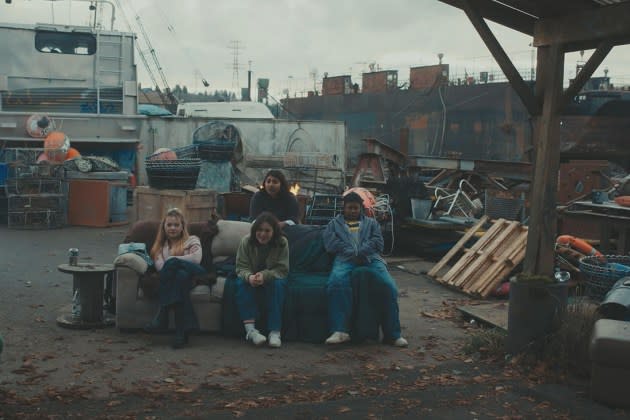‘Under the Bridge’ Review: Lily Gladstone and Riley Keough Star in Hulu’s Timid True-Crime Drama
- Oops!Something went wrong.Please try again later.

Deep into Hulu’s Under the Bridge, author Rebecca Godfrey (Riley Keough) defends the focus of her latest manuscript. “People can do horrible things, and that doesn’t make them inherently evil,” she insists. As she sees it, her book is simply challenging the reader to consider that an individual’s humanity is not defined by their worst deed.
It’s a big ask considering the subject in question has been charged with murder — but potentially a worthy one too, not least because the accused is just a teenager. Unfortunately, it’s also one Under the Bridge does not actually have the nerve to tackle head-on. Despite some moving performances (particularly from its young cast), the writing ultimately proves too vague and too muddled in its messaging to shed new light on much of anything.
More from The Hollywood Reporter
Lily Gladstone and Riley Keough DM'd About Indigenous Issues for Years Before 'Under the Bridge'
Lily Gladstone Thanks Fans Following Oscars Loss: "Feeling the Love Today"
Creator Quinn Shephard has based her eight-episode miniseries on the book of the same title by the real-life Godfrey, about the 1997 death of 14-year-old Reena Virk (Vritika Gupta). Initially, the only cop in Reena’s sleepy Canadian town who takes her disappearance seriously is Cam (Lily Gladstone). The rest of the department, led by Cam’s father (Matt Craven), presume Reena’s simply run away, to the frustration of her parents, Suman (Archie Panjabi) and Manjit (Ezra Faroque Khan).
But as it becomes more obvious that something horrible has occurred, suspicion falls on a small clique of group-home teens who call themselves the Crip Mafia Cartel — but who are more commonly referred to by police as “Bic girls” because, as ringleader Josephine (Chloe Guidry) explains, they’re considered “disposable.”
Thirty-something Rebecca finds herself near the heart of the case almost by happenstance — she’d already begun ingratiating herself with Josephine and her friends for a book about “the misunderstood girls of Victoria.” As hard-nosed Cam traces evidence, interviews witnesses and tries to use the authority granted by her badge to bring Reena’s family some semblance of justice, Rebecca, soft-spoken but unflappable, presents herself as a nonjudgmental ear or a helping hand to the kids; she seems more interested in understanding who they are than in who might have hurt Reena. Sometimes working in tandem and sometimes in opposition, Rebecca and Cam (who have their own complicated shared history) gradually piece together the tangled web of friendships, loyalties and betrayals surrounding Reena’s death.
It is largely through Rebecca’s eyes that we are made to understand the accused, the complicit and the guilty not just as potential suspects but individuals. Though Gladstone and Keough’s poignant chemistry grounds the story’s emotions, it’s their younger co-stars who truly get to shine. Guidry fills the screen as tough-talking Josephine, showing flashes of the vulnerable child still lurking beneath her wannabe-Gotti persona. Javon “Wanna” Walton brings a puppy-dog sweetness to Warren, an acquaintance of the girls who’s haunted by his memories of that night. Most heartbreaking of all is Aiyana Goodfellow as Reena’s friend Dusty; she plays the character’s growing panic and despair with a rawness that’s hard to watch and even harder to ignore.
For roughly the drama’s first half, the goal seems to be to push back on the idea that some kids are simply monsters. No matter what they’ve done, Under the Bridge asks us to remember, these are children, and vulnerable ones at that — cast aside by their families, failed by the system, deemed worthless by a society that reflexively assumes the worst of people on the margins.
But once the truth of Reena’s demise is revealed, the sympathy for these put-upon characters starts to increasingly get in the way of true empathy for their experiences. Rather than dare us to hold two evidently contradictory ideas in our minds — that these youths might be capable of unspeakable violence and that it might still be worth acknowledging the humanity within them — the series goes the easy route of separating them. One suspect it treats so gently that we’re not even allowed to know the true extent of their crimes until the very last minutes, too late to reflect on how it changes our understanding of them. Another it paints as exactly the sort of cartoonishly evil villain it had previously appeared to reject, making no attempt to understand their motives or history. Most of the rest fade into the background.
Meanwhile, Reena herself gets lost in the shuffle, despite copious flashbacks that detail not only the months leading up to her death but the decades of family history that came before. As charming as Gupta is onscreen, the writing rarely transcends a generic portrait of adolescent angst. Suman is at least more textured — Panjabi is heartbreaking as a mother mourning not only the loss of her daughter, but the chance to repair a relationship that had recently fallen apart over a disastrous effort by Reena to break free of Suman’s strict Jehovah’s Witness values.
But the script’s halfhearted suggestions that race or religion may have been factors in Reena’s killings peter out the same way everything else about the show does, with a timid shrug. Who killed Reena, and how, Under the Bridge does eventually tell you. Why it happened, it dares only to ask — but not, in the end, to answer.
Best of The Hollywood Reporter
A 'Star Wars' Timeline: All the Movies and TV Shows in the Franchise
'Star Wars': 16 Animated Characters Who Made the Leap to Live-Action
Power Showrunners: Hollywood’s 50-ish Most Influential Writer-Producers of 2023

